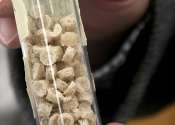The truth about bioplastics
Bioplastics are often touted as being eco-friendly, but do they live up to the hype?

Bioplastics are often touted as being eco-friendly, but do they live up to the hype?
Environment
Dec 14, 2017
0
283

Scientists at King's College London have developed an innovative solution for recycling single-use bioplastics commonly used in disposable items such as coffee cups and food containers.
Biochemistry
Jan 29, 2024
0
457

A new Tel Aviv University study describes a process to make bioplastic polymers that don't require land or fresh water—resources that are scarce in much of the world. The polymer is derived from microorganisms that feed ...
Polymers
Dec 24, 2018
17
1862

(PhysOrg.com) -- With the goal to reduce our dependence on fossil fuels, scientists are looking for alternative methods to produce plastics that are based on renewable oils. In a new study, scientists have developed a method ...
(PhysOrg.com) -- Stanford University researchers have developed a synthetic wood substitute that may one day save trees, reduce greenhouse gas emissions and shrink landfills.
Materials Science
Mar 17, 2009
2
1

Bioplastics made from protein sources such as albumin and whey have shown significant antibacterial properties, findings that could eventually lead to their use in plastics used in medical applications such as wound healing ...
Polymers
Mar 27, 2015
0
893

What if there was plastic-like material that could absorb excess nutrients from water and be used as a fertilizer when it decomposes? That product—a "bioplastic" material—has been created by University of Saskatchewan ...
Biochemistry
Apr 23, 2024
0
233

Conventional plastic is made from oil. The production of plastic is not sustainable, and it can contain substances we know are dangerous if ingested.
Environment
Oct 23, 2020
0
239

(PhysOrg.com) -- Every year, more than 250 billion pounds of plastic are produced worldwide. Much of it ends up in the world's oceans, a fact that troubles MIT biology professor Anthony Sinskey.
Materials Science
Nov 17, 2009
4
0

An ingenious new solution being engineered at the University of Canterbury (UC) aims to turn food waste into valuable chemical components that could be used to make bioplastics.
Materials Science
Jul 5, 2019
0
0
Bioplastics are a form of plastics derived from renewable biomass sources, such as vegetable fats and oils, corn starch, pea starch, or microbiota, rather than fossil-fuel plastics which are derived from petroleum. Some, but not all, bioplastics are designed to biodegrade.
This text uses material from Wikipedia, licensed under CC BY-SA